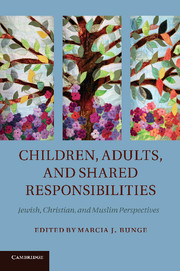Book contents
- Frontmatter
- Contents
- List of Contributors
- Acknowledgments
- Introduction
- PART I RELIGIOUS UNDERSTANDINGS OF CHILDREN
- Chapter 1 The concept of the child embedded in Jewish law
- Chapter 2 Children's spirituality in the Jewish narrative tradition
- Chapter 3 Christian understandings of children
- Chapter 4 Human dignity and social responsibility
- Chapter 5 Islam, children, and modernity
- Chapter 6 Muslim youth and religious identity
- Chapter 7 Imagining childism
- Chapter 8 Talking about childhood and engaging with children
- PART II RESPONSIBILITIES OF CHILDREN AND ADULTS
- Select bibliography
- Index of names
- Index of subjects
- References
Chapter 8 - Talking about childhood and engaging with children
A Christian perspective on interfaith dialogue
from PART I - RELIGIOUS UNDERSTANDINGS OF CHILDREN
Published online by Cambridge University Press: 05 October 2012
- Frontmatter
- Contents
- List of Contributors
- Acknowledgments
- Introduction
- PART I RELIGIOUS UNDERSTANDINGS OF CHILDREN
- Chapter 1 The concept of the child embedded in Jewish law
- Chapter 2 Children's spirituality in the Jewish narrative tradition
- Chapter 3 Christian understandings of children
- Chapter 4 Human dignity and social responsibility
- Chapter 5 Islam, children, and modernity
- Chapter 6 Muslim youth and religious identity
- Chapter 7 Imagining childism
- Chapter 8 Talking about childhood and engaging with children
- PART II RESPONSIBILITIES OF CHILDREN AND ADULTS
- Select bibliography
- Index of names
- Index of subjects
- References
Summary
Our societies are in the midst of what Harvard scholar of religion Diana Eck has called “interfaith revolutions.” Globalization and immigration trends have made our world increasingly pluralistic and diversified. With increased numbers of Muslim, Hindu, Sikh, and Buddhist immigrants in Western countries, the number of mixed marriages is rising steadily, and conventional religious landscapes are changing.
Given the reality and people's growing awareness of religious pluralism, we know and learn more about each other's religions than ever before, and interfaith initiatives abound. Conventional models of interfaith dialogue have been predominantly theological, led primarily by religious leaders who focus on doctrines or beliefs. Over the course of the last decade, however, several authors have started to address some of the limits of this conventional approach, proposing alternatives. Indeed, a number of new inter-religious activities and initiatives launched by other groups have emerged at grassroots and popular levels that focus less on issues of belief and more on religious practices, sacred texts, service projects, or common ethical concerns.
Despite the growing number of diverse inter-religious and interfaith initiatives and approaches, “doing” interfaith at whatever level is never easy. Genuine and fruitful inter-religious discussions or encounters are difficult. Participants in interfaith initiatives grapple with ongoing tensions about how to be concurrently open to other religious traditions while maintaining their own religious identity. Yet, although we all agree on its relevance for contemporary society, some current inter-religious engagements are narrowly focused and of interest only to certain groups. In addition, the structures in which dialogue takes place often give some kinds of participant a high-level platform while reducing others to positions of silence.
- Type
- Chapter
- Information
- Children, Adults, and Shared ResponsibilitiesJewish, Christian and Muslim Perspectives, pp. 152 - 168Publisher: Cambridge University PressPrint publication year: 2012



